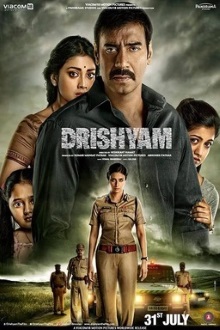
So I think I got this from Marginal Revolution but I only realized that it’s a remake until after watching it. It might have been a better idea to watch the original Malayalam-language film from 2013 that won a whole slew of awards even if this Hindi-language version had a wider audience and earned more money.
Vijay Salgaonkar is a contented middle-class man with a family, owns his own cable television service and is a die-hard fan of films. After his daughter Anju returns from a nature camp outing, she is harassed by a boy who has secretly filmed her showering. She tells her mother about it and they confront the boy, ending with Anju accidentally killing him and her mother helping to bury the body in their own garden. Anju then reveals that the boy is the son of the Inspector-General of Police in Goa. When Vijay returns home he resolves to keep his family members out of jail and drawing on his extensive knowledge of film plots, hatches a plan to cover up the crime. This involves getting rid of the boy’s car, creating a false trail for his mobile phone and forging an elaborate lie that the entire family was away at another city during that time. A local corrupt police officer who Vijay is always at odds with testifies that he has seen him with the boy’s car and the boy’s mother, the IGP, is a formidable officer whose instincts tell her that Vijay is hiding something. Yet try as they might, they struggle to find any evidence of his wrongdoing.
This film suffers from all of the usual faults of Indian cinema. It is far too long, clocking in at over two hours and forty minutes, with the initial setup scenes being almost painful to get through. Director Nishikant Kamat seems to feel obliged to assume a low level of intelligence on the part of the audience such that everything is telegraphed far in advance and made super obvious. This wastes even more time as the camera lingers on the faces of characters as they look knowingly at objects so that no one misses the connections. I particularly detest the slow-motion movement added to give dramatic weight to characters. Partly out of this tendency to exaggerate and make things obvious, the acting is sub-par as well which harms believability.
So surely that makes Drishyam an awful film? Well, not entirely because the plot is actually quite decent and Vijay ‘s scheme to concoct a believable alibi is nothing short of brilliant. I especially liked how he takes advantage of the fact that human memory is unreliable and easily manipulated. It’s a great example of how a person can often better remember a later account of an incident than a direct memory of the incident itself. Vijay’s instructions to his family of how to stand up to police interrogation also displays an excellent understanding of psychology. I love how he isn’t complacent about how determined the police investigation will be and genre aware enough to realize that he should keep secret his plans from the rest of his family. It isn’t quite believable that he learned all this from watching movies but I suppose that can be forgiven.
I think Marginal Revolution also liked it for its inadvertent insights into contemporary India. Police brutality isn’t unexpected, but it’s still shocking how casually they resort to it in interrogations. So is petty corruption and how most people are completely helpless against it. Obviously this film needs to demonize the police in order to justify the protagonist’s law-breaking but I believe that on some level this is really what Indians do expect of their police. I was also surprised that there are such things as a local cable television company run by effectively two people. It brings to mind what The Economist keeps talking about how the Indian economy is dominated by tiny firms involved in an unimaginably large variety of industries.
While there are points in this film’s favor, it’s hard to justify its running time and what is assuredly a very old-fashioned style of filmmaking. As clever as the plot is, it might more worthwhile to watch some other version of the film. In addition to the versions of it made for the many different languages spoken in the Indian sub-continent, there is also a Japanese and more recently a Chinese adaptation. Surely one of these must have better execution than this one. Watch and let me know!